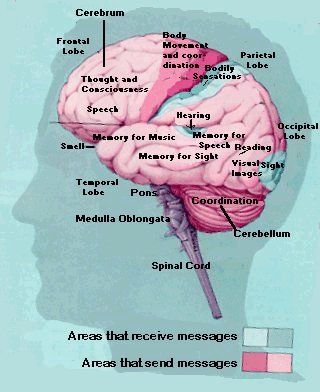Video Games--Not Just About Having Fun--Benefits of Playing


Background
Since the 1970’s video games have been under attack (Suddath) and questioned regarding the benefits of playing and often times deemed as beneficial as watching television. Video Games (scrutinized by researchers, scientists, educational groups and various other groups) increase in popularity each year and now many new reports show that playing video games increase critical thinking skills and extremely beneficial to both children and adults.
Many groups and researchers would say otherwise, however, the U.S. Department of Defense, the Federation of American Scientists, the Wisconsin Center for Education Research, as well as others released new information that shows the benefits. Video games can increase the simultaneous use of both hemispheres of the brain and allow the player to apply the same skills used in video games to real life situations.

Video Games and Cognitive Abilities
Cognitive abilities—ability to think, learn, memorize etc., increase in those that play video games moderately versus those that do not play video games. Video games can increase the simultaneous use of both hemispheres of the brain and enabling the video game player to apply the skills learned while playing, to everyday life situations.

Brain Function
Dr. Ray Perez, has a doctorate in educational psychology and works as “a program officer at the ONR's warfighter performance department” (Freeman), states that those that play video games increase cognitive abilities up to 20% higher than those that do not play.
Perez believes brain plasticity (see Glossary) increases due to the “neural networks” (Ohab) used while playing games. Blood flow increase to the prominent neural networks, used while playing video games, increases coordination with other networks in the brain. This allows the player greater short-term memory skills, “being able to work outside your present mindset, to think beyond what you have been taught, to go beyond your experience to solve problems in new and different ways.” (qtd. Ohab)
While playing video games, the brain uses both hemispheres simultaneously as the player solves each level of the game played. Figure 1, below, shows a simplified version of the two hemispheres of the brain and their function.

Many war games (shooter/action), RPG, strategy, and even time management games, requires the game player to use logic, motion, patterns, context, spatial awareness, time awareness, recalling, sound and music, etc. at the exact moment in time. The game player, immersed in a virtual environment with only a set number of skills and items, has to rely on quick thinking abilities in order to complete quests and/or levels. Most all games add the element of a time limit in order to complete the level. In the case of shooter and RPGs, while trying to solve puzzles, the player also has to defeat enemies and use many different aspects of strategic planning in order to accomplish their goals.


Video Games and Strategic Planning and Defense
Due to the skills required to play video games and the increase of brain function along with research studies conducted, the U.S. Department of Defense finds that playing video games increase the soldier’s ability to not only defeat the enemy, but also discover stealthier ways of accomplishing their missions.
Games like Call of Duty based on Army training simulation, forces the player “to learn to think and act like a modern professional soldier” (Shaffer, Squire, Halverson, Gee) in order to survive the game. Reports conducted showed that a soldier’s abilities on and off the field increased drastically.
The FAS President, Henry Kelly, states during a 2006 summit, “how do you analyze problems, how do you acquire information quickly, how do you make decisions under uncertainty, how do you build teams, how do you adapt to change rapidly?” (“Harnessing the power…”) Playing modern day video games and computer games involves the game player into the higher order of thinking required not only on field, but in everyday life as well.
In a report published by William Krebs, PhD and works for ONR, suggests game based training increases a soldier’s cognitive readiness by 50%, and up to 15% in skill retention. His report also states the soldiers using game based training will have an “improved ability to think through uncertainty, develop innovative concepts, capabilities and strategies; fully exploit advanced technologies, systems and platforms; understand cultural/regional issues; and conduct operations as a coherently joint force.” (Krebs)

Video Games and Hand/Eye Coordination
Playing Video games drastically improves hand and eye coordination as well as cognitive abilities. A study conducted by Douglas Gentile (PhD in psychology, Iowa State University) on 33 laparoscopic surgeons (invasive surgery) showed that the surgeons that played video games were not only 27 percent faster on advanced surgical procedures than those that did not play, however, made 37 percent fewer errors. Another study of 303 laparoscopic surgeons showed that surgeons that played video games prior to performing surgery had better spatial skills and hand dexterity on all ten trials versus surgeons that do not play. (“Studies Show Benefits…”)

Video Game Controls—Reason for Speed
Video games on a PC require the use of a keyboard and mouse—the player has to use several keys on their keyboard while pointing and clicking the mouse at the same time. Video game console systems (examples--PS3, Xbox 360, Wii) have a game controller required to play the games. Most of the game controllers have buttons, control knobs, left and right analog sticks etc. that the user needs to press rapidly whilst trying to solve the level and often the controller becomes second nature as well as the speed required to complete the tasks.
The picture below shows the PS3 game controller with all of the buttons the player needs to press often simultaneously and in different patterns—example, looking at the figure below, a player would press triangle, circle, square, and x at nearly the same time and in different combinations.


Video Games and Everyday Life—Children and Adults
The skills learned while playing video games enhances skills used in everyday life. Each individual has their own way of learning. However, studies show that 90% of people learn from experience, including simulations found in video games. While only 10 % retain what they read. (“Harnessing the power…”) Video games have a higher rate of retention than that found in a classroom or work place environment.

Children
Note: Parents should and need to monitor the games their children play as well as put a limit on the amount of time the children play video games.
According to the FAS, children should play more video games, not less because games “can teach higher-order thinking skills such as strategic thinking, interpretive analysis, problem solving, plan formulation, and execution, and adaptation to rapid change” (qtd. Wood)--skills desperately needed in everyday life situations as well as skills applied in the adult world.
Past research grabbed the attention of the American Psychological Association. Fran C. Blumberg, PhD, (Fordham University psychologist) researched a total of 122 children in grades five through seven. Her focus included problem solving abilities while playing video games the children never played before. Her research concluded that video games do improve “cognitive and perceptual skills.” (“Studies Show…) Other possibilities include that children that have Attention Deficit Disorder or children that are Autistic can benefit and “help them increase their ability to concentrate” (Thorpe) as well as relieve the player from stress and frustration instead of acting out (hitting) like children tend to do.
Video games, regardless of age, social status, creed etc., places the game player into a role that they may never have known, or because of circumstance, would not be able to obtain the skills necessary to play that role in real life. Children that play strategy games could learn essential skills that could teach them to become leaders within a community or even larger scale. Strategy games allow the child to learn skills such as financing, trading, buy and selling, commodities, and budgeting. (Shaffer, Squire, Halverson, Gee) Other types of games can teach children other skills such as hand and eye coordination, strategy, problem solving, and even social skills.


Adults
Many state that video games provide escapism from everyday life stress—immersing the game player into a virtual world that allows them to take out frustration in a fantasy setting. Besides gaining cognitive abilities, strategic, logic, hand and eye coordination (to list a few), MMPOG allow other players to interact with each other on a global scale. This could help the game player become tolerant of other cultures, races, creeds, etc. and teach them the value of teamwork. Many MMPOGs require players to join guilds/alliances, and in order to survive or succeed, teamwork is essential.
With that said, studies show that playing video games can help older adults with depression. MMPOGs allow everyone to socially connect with others and allowing the player to be part of other’s lives. In a way, allows the older adult to remain active and socially connected to the outside world. Other studies show that video games, due to increased brain plasticity, can slow down the effects of Alzheimer’s and other short-term memory disorders. A study conducted by Arthur Kramer (University of Illinois PhD in psychology) proved that older adults that played video games, retained information learned from strategy games than those that did not play. Some of the skills learned were those needed in everyday life such as time management, budgeting, and multi-tasking. “Their working memory, as reflected in the tests, was also significantly improved. Their reasoning ability was enhanced…” (Nauert)


Conclusion
While many argue that video games have as much value as watching television, others state video games have a negative impact on society, cause for obesity, and increase in violence—no more than violence showed on most cartoons and even Disney movies, video games have more benefits than not. In the age of technology, the video game culture continues to grow each day. More and more modern day research proves playing video games improve cognitive abilities necessary for everyday life.
Many may not like the idea of video games having a positive impact; however, video games will become the future of learning. With increased cognitive abilities, the human brain can expand into areas previously not used. With increased problem solving abilities, strategic thinking and logic, will help solve many of the problems on a global scale. Those same skills, as individuals, can help one cope with everyday life decisions, as well as stress, and depression. With increased hand and eye coordination, Surgeons will have the ability to perform surgeries previously considered too risky. Video games can help others feel socially connected and remain active as a whole.
Video games do not care about social status, creed, sex, etc., and allow those to be who they want to be in a virtual world—if even for a short time. Regardless of many opinions, playing video games in moderation improve many areas of life—video games bring people into roles and worlds that can expand the mind into realms of the unknown—and a sense of freedom from day to day life. In a society with so many pressures, video games provide escapism and at the same time improve critical skills necessary to survive—a benefit to everyone.

Glossary of Terms
Adventure Games: Adventure games, set in various game worlds and environments. The game player often explores new territories, solve puzzles, find goal specific items, defeat enemies using weapons, and various strategies
Brain Plasticity: The brains ability to reorganize neural pathways based on new skills, new knowledge, and new experiences, to list a few. As we learn new things, and use those skills, brain plasticity allows our brain to change with our new skills, based on what we have learned. In a way, expands our brains to adjust to new learning capabilities. (“Brain Plasticity…”)
ESRB: Entertainment Software Rating Board. Responsible for rating games for age appropriateness. (see Appendix B for rating system)
FAS: Federation of American Scientists.
FPS: First Person Shooter—see Shooter.
MMPOG: Massive Multiplayer Online Game. Also called MMOs and MMOGs. Online games that have thousands of players from around the world. Many MMPOGs require players to join guilds/alliances for survival purposes. Many games purchased now have the option of playing the game on home console as a one player, or a co-op option to play at home as a two player, or the game player can chose to play the game online. One of the most popular MMPOG game would include WoW (World of Warcraft)
ONR: Office of Naval Research.
PC: Personal Computer.
PS3: Playstation 3, next generation gaming console made by Sony.
Puzzle: Puzzle Games, set in various backgrounds and setting. Requires the game player to solve various puzzles within a short period of time. This includes matching certain items, searching for various items on a list, solving complex questions, solving riddles, and solving mysteries. Sub-genres of puzzle games include match-three and hide and seek games.
RPG: Role Playing Game, typically set in fantasy setting. Sword and sorcery games that often involve solving puzzles, riddles, and quests, use both melee and magical attack strategies, leveling up your hero in skills such as strength, dexterity, intelligence—key to defeating higher level enemies—resource management, and in some cases—time management.
Shooter: Action games, often set in a war/apocalyptic setting. Often guns and other types of modern day weapons are used to defeat enemies. These games often involve war tactics, melee strategies, stealth, solving puzzles and quests, leveling up your hero in ammo capacity, upgrading weapons, often includes time management, and targeting abilities.
Strategy: Strategy games, often a map setting with cities (modern day or fantasy) and other icons. Strategy games often involve the game player to control cities, build armies, collect resources, keep townspeople happy and expand buildings to increase happiness, production, education, etc. also have to deal with taxes, income, etc. whilst taking over enemy cities and expanding the players kingdom/country.
Time Management: Time management games, set in various settings. Highly involve reaching certain goals within an allotted time frame. Used in many type of game genres and in the casual game market—example Facebook game applications.
Wii: Wii, next generation gaming console made by Nintendo. Typically, family friendly games and allows the player to interact with motion using the game controller.
Xbox 360: Xbox 360, next generation gaming console made by Microsoft.

Works Cited
ArticPenguin. “Play As Life.” January 2, 2010.
“Brain Plasticity: What is it?”
Freeman, Bob. “Researchers Examine Video Gaming’s Benefits.” U.S. Department of Defense. 2010
“Harnessing the power of video games for learning.” Federation of American Scientists. 2006. Web.
Krebs, William Ph.D. “CMP-FY08-01 Game Base Training.” Office of Naval Research. 2010. Web.
Seth. “Benefits of Playing Video Games.” Federation of American Scientists. September 1, 2010
Suddath, Claire. “Brief History: Video Game Violence.” Time. May 10, 2010.
Thorpe, Jen. “Benefits of playing video games.” May 6, 2007.
Wood, Danielle. “Scientists Say Kids Need More Video Games.” Education.com

- Advantage of Playing Video Games
New studies show that playing video games do have advantages.Prevalent games owe its popularity not just simply because it is difficult in terms of manual dexterity but because it is mentally challenging as well. - Playing Video Games: In Case You Haven’t Heard, It’s Good For You

Please Note Video Games Should Be Played in Moderation And Always Use Discretion On Game Choice!!
Do You Play Video Games?
If Answered Yes, How Many Hours A Day?








